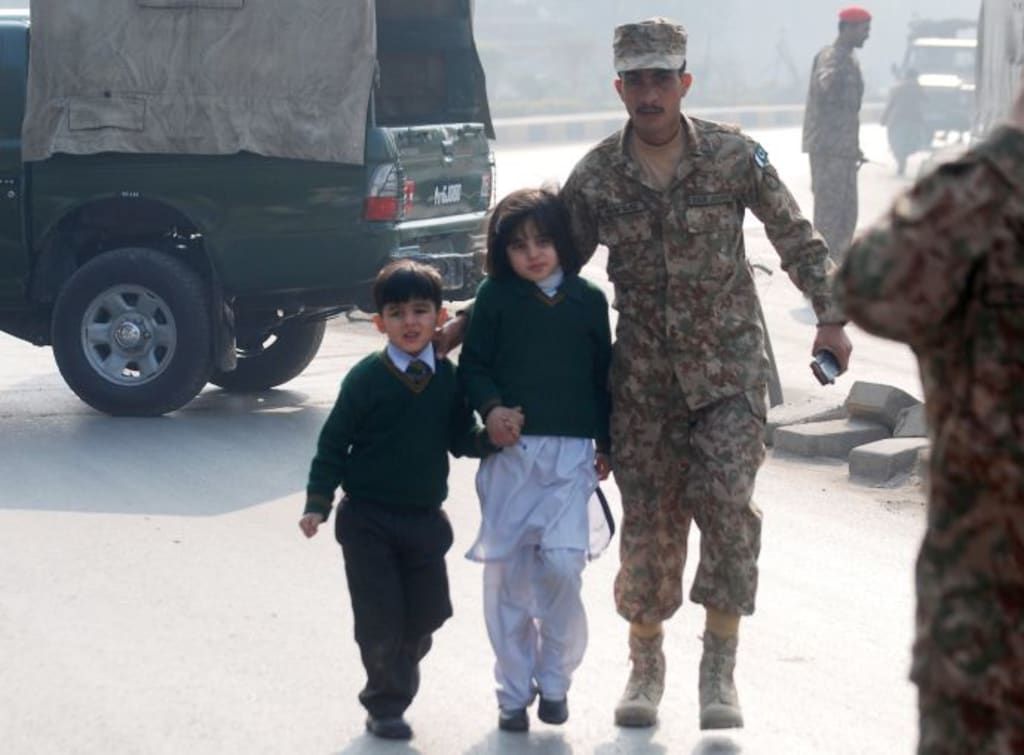APS Peshawar Attack 2014
Deadliest Terror Attack In Pakistan History!

The Army Public School attack in Peshawar, which occurred on December 16, 2014, is a tragic event that left a lasting impact on Pakistan and the world. This attack was carried out by the Tehrik-i-Taliban Pakistan (TTP), also known as the Pakistani Taliban, and resulted in the deaths of over 140 individuals, most of whom were schoolchildren. The attack shocked the nation and galvanized public opinion against terrorism and extremism. In this essay, we will delve into the details of the APS Peshawar attack, its aftermath, and its implications for Pakistan's fight against terrorism.
The Army Public School attack, often referred to as the Peshawar school massacre, is one of the deadliest terrorist attacks in Pakistan's history. On the morning of December 16, 2014, militants from the TTP stormed the Army Public School in Peshawar, a school attended by children of military personnel. The attackers scaled the walls of the school and began a ruthless assault on the students and staff.
**The Attack**
The attack unfolded with extreme brutality. Gunmen entered the school premises and targeted classrooms where students were attending classes. They indiscriminately fired upon teachers and students, leaving a trail of horror and devastation. The attackers wore suicide vests and used explosives, resulting in a high number of casualties. The attack lasted several hours before security forces were able to regain control of the situation.
The assault left 147 people dead, including 132 children and 10 staff members. Many others were injured, some of them critically. The attack sent shockwaves through Pakistan and the international community, with images of bloodied classrooms and grieving parents circulating in the media.
**National Outrage and International Condemnation**
The APS attack elicited a wave of public outrage across Pakistan. The sight of innocent children and educators brutally murdered struck a chord with people from all walks of life. The attack was widely condemned by political leaders, religious scholars, and civil society organizations both within Pakistan and around the world.
**Government and Military Response**
The Pakistani government and military responded to the APS attack with a renewed determination to combat terrorism. The government declared a national day of mourning, and schools across the country closed their doors in solidarity. In the aftermath of the attack, the government lifted the moratorium on the death penalty for terrorism-related cases, leading to the execution of several convicted terrorists.
Operation Zarb-e-Azb, a military offensive against terrorist groups operating in Pakistan's tribal regions, gained momentum following the APS attack. The operation aimed to eliminate militant strongholds and disrupt their networks. It was a significant step towards countering terrorism and extremism in the country.
**Change in Public Opinion and Counterterrorism Policies**
The APS attack marked a turning point in public sentiment regarding terrorism and extremism. The horrific nature of the attack, coupled with the young age of the victims, united people against the menace of terrorism. Pakistani society, already fatigued by years of violence, became even more determined to see an end to the bloodshed.
The attack also led to a shift in Pakistan's counterterrorism policies. The government and military intensified efforts to eliminate terrorist groups, focusing on intelligence-driven operations and coordination among law enforcement agencies. The National Action Plan (NAP) was devised to address terrorism comprehensively, including measures to curb hate speech, dismantle terrorist networks, and reform madrassas (religious schools).
**Education and Societal Impact**
The APS attack had a profound impact on Pakistan's education sector and society at large. Schools across the country enhanced security measures, including the installation of surveillance cameras, increased security personnel, and improved entry protocols. The attack reinforced the importance of providing a safe and secure environment for students.
Furthermore, the attack galvanized civil society organizations and activists to advocate for peace, tolerance, and education. The tragedy led to increased awareness about the dangers of radicalization and the importance of countering extremist ideologies at an early stage.
**International Cooperation and Solidarity**
The APS attack received global attention, and condolences poured in from leaders and citizens around the world. It underscored the universal condemnation of terrorism and prompted renewed calls for international cooperation in the fight against extremism. The attack demonstrated that terrorism is a common enemy that transcends borders and necessitates collective action.
**Challenges and Ongoing Struggles**
Despite the significant steps taken in the aftermath of the APS attack, Pakistan continues to face challenges in its fight against terrorism. Extremist ideologies persist, and some terrorist groups operate from sanctuaries across the border in Afghanistan. The complex security situation demands sustained efforts to ensure the safety and stability of the country.
The APS Peshawar attack remains a painful chapter in Pakistan's history, serving as a stark reminder of the brutality of terrorism. The loss of innocent lives, particularly young students, shook the nation to its core. However, from this tragedy emerged a renewed determination to confront extremism and ensure a safer future for Pakistan's generations to come.
The attack's aftermath saw a united front against terrorism, with the government, military, civil society, and citizens collectively working to counter the menace. The APS attack acted as a catalyst for change, spurring policy reforms, international cooperation, and grassroots efforts to promote peace and tolerance.
While challenges persist, the memory of the APS attack continues to inspire Pakistan's commitment to defeating terrorism and creating a society where peace and harmony prevail. The legacy of the victims lives on through efforts to build a more secure, prosperous, and resilient Pakistan.
About the Creator
Fatima Imran
A patriotic Pakistani sharing with you ''THE REAL PAKISTAN''
STUDENT/19.






Comments
There are no comments for this story
Be the first to respond and start the conversation.